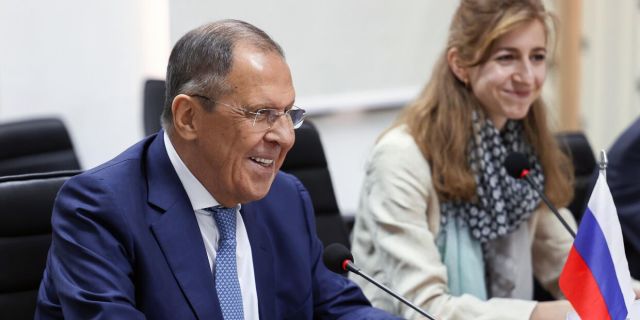Asharq Al-Awsat: Lavrov's visit to Sudan caught Western ambassadors by surpriseSergey Lavrov's African tour continues, writes Asharq Al-Awsat.
After Mali, he visited Mauritania — this is the first visit of the Russian Foreign Minister since the establishment of diplomatic relations between Nouakchott and Moscow. The next destination was Sudan — and this took the EU and US ambassadors by surprise.
Russian Foreign Minister Sergey Lavrov will visit Mali, Mauritania and Sudan as part of an African tour. Africa, rich in natural resources, is once again becoming an arena of confrontation between Moscow and the West.
"We will continue to help resolve issues on the African continent. We consistently proceed from the fact that the problems here should be solved on the basis of the principle of "African problems — an African solution". The fight against terrorism is also relevant for other countries in the region. We will assist them in overcoming difficulties. This applies to Guinea, Burkina Faso, Chad, the entire Sahara-Sahel region and the coastal countries of the Gulf of Guinea," Lavrov said during a press conference with his Malian counterpart Abdoulaye Diop.
Lavrov's visit to Mali, which has witnessed extremist violence and a deep multidimensional crisis, demonstrates the rapprochement between Moscow and Bamako against the backdrop of a rupture in relations with France and its allies.
Russia will continue to provide military support to Mali, provide it with weapons and send hundreds of servicemen who have been trained in the Russian army or are part of the Wagner PMCs to the country. Lavrov promised to strengthen Moscow's presence on the continent, which, according to him, faces the "neocolonial approaches" of the West.
Lavrov arrived in Nouakchott on Tuesday evening. This is the first visit of the Russian Foreign Minister to Mauritania since the establishment of diplomatic relations between the two countries. His trip to Nouakchott coincided with the visit of the European security mission, which arrived to meet with Mauritanian officials led by Defense Minister Hannah Ould Sidi.
Although the Russian Foreign Minister has been frequently in Africa in recent years, Mauritania has not previously been on his agenda.
Mauritania, which NATO calls the "only reliable partner" in West Africa, and the European Union considers a "key ally," is now forced to solve more complex regional and global problems. At the end of this year, she intends to join the club of gas exporters. Mauritania is cautiously watching the desire of the countries of the Sahara-Sahel region (Mali and Burkina Faso) to strengthen relations with Russia and the decline of the traditional presence of France. It seems obvious that a "diplomatic war" has broken out between the two camps, taking place in one of the poorest and most vulnerable regions of the world.
Despite the active development of relations between Nouakchott and Moscow, this does not compare to the relations of Mauritania, the European Union and the United States. On Monday, the European security mission arrived on a visit to Nouakchott, which will last until Thursday. She has already met with Defense Minister Hannah Ould Sidi.
The Russian Foreign Minister went on a working visit from Nouakchott to Sudan. Lavrov's trip coincided with the visit of six ambassadors of the European Union and the United States and took them by surprise.
According to the official SUNA news agency with reference to the Sudanese Foreign Ministry, during Lavrov's visit, topical issues of the bilateral and regional agenda will be discussed.
News analysis shows that Lavrov has the following files on his agenda: the confrontation between Russia and the West in Sudan and the role of the Wagner PMCs in the region.
According to the Sudan Tribune, the United States is exerting strong pressure on both Sudan and Libya to break off relations with the Wagner PMCs. The West is trying to sway Khartoum to its side, and curb Moscow's ambitions in West Africa.
It should be noted that the Wagner PMCs has been present in Sudan since 2017. Ousted President Omar al-Bashir sought to form an alliance with Russia, get military support from it and protect himself from the Americans, as well as resist the protests his administration faced, in exchange for expanding the Russian presence in Africa and Sudan, in particular.

